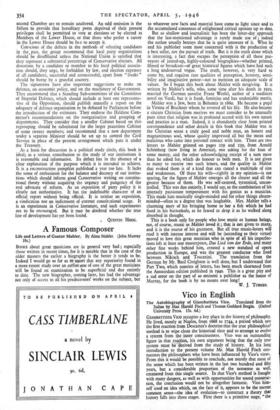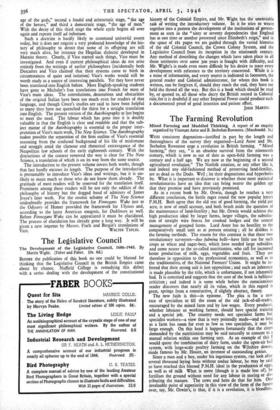Vico in English
GIAMBATTISTA Vico occupies a key place in the history of philosophy. He lived, mostly at Naples, from 1668 to 1744, a period which saw the first reaction from Descartes's doctrine that the true philosophical method is to wipe clean the historical slate and to attempt to evolve a system from the inner consciousness. Vico was an outstanding figure in that reaction, his own argument being that the only true system must be derived from the study of history. In his long introduction to the present volume Mr. Max Harold Fisch enu- merates the philosophers who have been influenced by Vico's views. From this it would be possible to conclude, not merely that most of the sense which has been written in the last two hundred and fifty years, but a considerable proportion of the nonsense as well, emanated from this single source. In that Vico's method is fraught with many dangers, as well as with opportunities for sound construc- tion, the conclusion would not be altogether fantastic. Vico him- self used an idea which, on the face of it, appears to be the merest common sense—the idea of evolution—to construct a theory that history falls into three stages. First there is a primitive stage, "the
age of the gods," second a feudal and aristocratic stage, " the age of the heroes," and third a democratic stage, " the age of men." With the decay of this third stage the whole cycle begins all over again and repeats itself ad infinitum.
Such a doctrine is hardly likely to command universal assent today, but it does not require a very profound knowledge of the his- tory of philosophy to detect that some of its offspring are still very much alive, for instance the Hegelian dialectic developed in Marxist theory. Clearly, if Vico started such things, Vico must be investigated. And even if current philosophical ideas do not arise entirely from the writings of earlier philosophers (incidentally both Descartes and Vico claimed that their systems came to birth in circumstances of quiet and isolation) Vico's works would still be worth study as a source of interesting parallels. Yet they have never been translated into English before. Most English-speaking students have gone to Michelet's free translations into French for most of Vico's main ideas. The convolutions, decorations and obscurities of the original Italian have been too much even for readers of that language, and though Croce's studies are said to have been helpful to many they have not quenched the thirst for a straight translation into English. The present version of the Autobiography at last begins to meet the need. The labour which has gone into it is doubly valuable in that the English is clear and readable and that the sub- ject matter of the Autobiography is essential to the proper inter- pretation of Vico's main work, The New Science. The Autobiography makes possible the separation of the firm outline of Vico's essential reasoning from the confused background of his life of misfortune and struggle amid the clamour and rhetorical extravagance of the Neapolitan law schools of the early eighteenth century. With the distractions of the context removed the way is clear for The New Science, a translation of which is on its way from the same source.
The introduction to the present volume covers both works, though that fact hardly excuses its length. The purpose of the introduction is presumably to introduce Vico's ideas and writings, but it is un- likely to mean much to those who do not know them already. The gratitude of most readers will be reserved for the translation itself. Prominent among those readers will be not only the addicts of the philosophy of history but the dogged band of admirers of James Joyce's later work. For the cosmic scheme of The New Science undoubtedly provides the framework for Finnegans Wake just as the Odyssey of Homer provided the framework for Ulysses and, according to the latest American exegesis, for Dubliners as well. Before Finnegans Wake can be appreciated it must be elucidated. The process of elucidation has already gone a long way. .It will be given a new impetus by Messrs. Fisch and Bergin's translations of































 Previous page
Previous page